|
|
|
Sort Order |
|
|
|
Items / Page
|
|
|
|
|
|
|
| Srl | Item |
| 1 |
ID:
171316
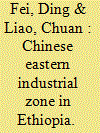

|
|
|
|
|
| Summary/Abstract |
This paper examines China’s engagement with Africa through economic zones (EZs). It moves beyond the conceptualisation of EZs as undifferentiated enclaves of foreign investment to a dynamic perspective on the locally negotiated process of zone development. Such a perspective entails critical unpacking of the specific zone regime to understand the diverse and evolving relationships among different state and non-state actors. Drawing upon empirical research on the Eastern Industrial Zone (EIZ) in Ethiopia, we explore the complex process of learning and adaptation by government, developers, investors, and workers throughout the development of a zone regime, with specific attention to capital–labour and expatriate–local relations. We find that despite the EIZ being a state-level cooperation project, private Chinese developers work diligently with the Ethiopian government to improve the institutional support for EZs. Chinese investors also collectively generate a management regime to enhance their overseas operational capacity and experiment with various tactics to transform local recruits into an industrial workforce. Local workers, with limited protection by official labour unions, turn to individual- and group-based agency to improve their working conditions. Despite the momentum created by multiple stakeholders, there are concerns regarding the long-term contributions of EZs to engender sustained industrial transformation and skills development.
|
|
|
|
|
|
|
|
|
|
|
|
|
|
|
|
| 2 |
ID:
171315


|
|
|
|
|
| Summary/Abstract |
What has driven China, a developing country that has only recently saved itself from nationwide poverty, to increase its investment in social welfare so rapidly and extensively in the past decade? Drawing on extensive field research in a prefecture-level district in southwest China between 2014 and 2017, the authors argue in this article that local governments in China provide welfare housing programmes as a veil for developmentalist industrial policies aimed at industrial upgrading and the improvement of dynamic efficiency. The article demonstrates the unique incentive structure behind the local Chinese governments’ role as the front-line investor in social welfare benefits, and how the local state has cunningly used the façade of welfare provision to (1) divert the earmarked budget to implement development-oriented industrial policy; and (2) fake a discursive congruence between the heavily interventionist local practice and the overall neoliberal central-level policy discourse that features deregulation, small government and a laissez-faire developmental pathway. Exploring this set of strategic dynamics underlining the manoeuvres of the Chinese welfare operation helps us understand the variability of welfare state forms and trajectories of developmental strategy in the Global South.
|
|
|
|
|
|
|
|
|
|
|
|
|
|
|
|
| 3 |
ID:
171320
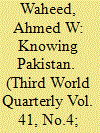

|
|
|
|
|
| Summary/Abstract |
This article explores the processes that contribute towards the image of Pakistan as portrayed to the West. It does this by critically analysing the discursive practices through which knowledge, and a general idea of Pakistan, are created, for example in South Asian area studies journals and South Asian studies centres in Western universities. This article demonstrates that most scholarly research on Pakistan, as published in South Asian studies journals, is in fact heavily influenced by the research of American and European scholars. It argues that as the positionality of these Western scholars is further based on ‘academic quality’, this causes a continuous circle of knowledge production. In this circle, the Western academic produces ‘quality’ work in top area studies journals. Their work then receives wider circulation due to the scholar’s positionality and status within elite, Western centres of knowledge production, whereas research in South Asian studies centres is predominantly India-centric. While true to their proposed research ambit, research conducted on India in South Asian studies centres is multidisciplinary in nature. In Pakistan’s case, most of the research, however marginal, remains centred on the country’s security and its international affairs.
|
|
|
|
|
|
|
|
|
|
|
|
|
|
|
|
| 4 |
ID:
171319
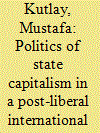

|
|
|
|
|
| Summary/Abstract |
This article discusses the transformation of the liberal international order, with reference to the ways in which global shifts affect the developmental paradigms among the emerging middle powers. Although it is rarely contested that the liberal order is being severely tested, the dynamics and potential consequences of this transformation are a matter of intense controversy. Also, the debate mainly focuses on great power politics, without paying adequate attention to the ways in which middle powers are influenced by and inform the transition to a post-liberal international order. By focusing on the case of Turkey, this article addresses whether non-Western great powers (Russia and China in particular) are leading the emergence of alternative order(s), and if so, through what mechanisms. Based on the reciprocal interactions between ideas, material capabilities and institutions, I argue that the preferences of the Turkish ruling elite seem to be gradually shifting from a Western-oriented liberal model towards a variety of ‘state capitalism’ as an alternative developmental paradigm in a post-liberal international order.
|
|
|
|
|
|
|
|
|
|
|
|
|
|
|
|
| 5 |
ID:
171313
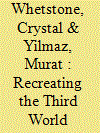

|
|
|
|
|
| Summary/Abstract |
In this paper, we make a theoretical argument that the Third World be returned to its political origins to inspire an updated Third World Project (TWP), revived as a global movement for progressive, anti-imperialist forces, through the Fourth World movement, which highlights internal colonialism. Both the TWP and the United Nations recognise only nation states as full members. We examine how a Third World strategy that brings in the Fourth World, or indigenous, minority and/or stateless groups, can help oppressed groups gain more autonomy and rights through a transnational solidarity rooted in empathy. We trace the intellectual roots and history of the TWP and consider obstacles in bringing together the TWP and the Fourth World movement. A Fourth World strategy corrects the TWP’s implicit approval of an underlying imperialism, and the TWP provides the Fourth World movement a model to accomplish its goal of resisting uncritical modernity.
|
|
|
|
|
|
|
|
|
|
|
|
|
|
|
|
| 6 |
ID:
171318


|
|
|
|
|
| Summary/Abstract |
Since the 1979 Revolution, the Iranian state has adopted a sophisticated set of policies to assimilate the Eastern Kurds. The Kurds are often the main target of the Iranian state’s military operations, its assimilatory strategies, and its regime of surveillance. After the ‘conquest’ (fath) of Eastern Kurdistan (Rojhelat) in 1979, the state tried to retain control over the region through systemic militarisation, the establishment of ‘revolutionary institutions’, and new religious and cultural centres, to transform the demographic, religious and cultural profile of Kurdistan. This paper is an attempt to illuminate the state’s religious nationalism and various forms of assimilatory strategies that the Islamic Republic of Iran has employed to transform Kurdish regions.
|
|
|
|
|
|
|
|
|
|
|
|
|
|
|
|
| 7 |
ID:
171317


|
|
|
|
|
| Summary/Abstract |
This article situates the far-right backlash in Brazil within the larger Latin American context, including its colonial legacy, leftist governments’ failure to deliver promises of inclusion, and the US–China geopolitical dispute over the region’s strategic natural resources. By situating Bolsonaro’s electoral victory within these dynamics, our analysis presents an alternative to two common perspectives. First, studies of the region’s political moment and of Brazilian society in particular do not pay enough attention to institutional and everyday racism, and instead focus mostly on comparative analysis of governmental policies and social class dynamics. Second, critical perspectives that take into account racial inequalities are often not attuned to structural dynamics of gendered antiblackness, and instead present racism as a broad set of practices that negatively affect non-white people in related manners. Our context-specific analysis of the electoral reemergence of the far right in Brazil aims at contributing to an understanding of persistent dynamics of racial inequality within the region as part of a long, enduring and foundational odium of Black people.
|
|
|
|
|
|
|
|
|
|
|
|
|
|
|
|
| 8 |
ID:
171321
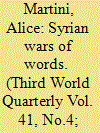

|
|
|
|
|
| Summary/Abstract |
This article presents a study of the ‘wars of words’ among selected parties involved in the Syrian conflict. Based on a combination of content analysis and critical discourse analysis (CDA), it examines actors’ discourses within the United Nations Security Council (2011–2015), the global arena of confrontation and international legitimisation of armed actions. Here, it investigates their instrumentalisation of the word ‘terrorism’ and the war on terror narrative, and it explores the dynamics of discursive (de)legitimisation of the use of violence in Syria. The article shows how parties instrumentalised this narrative to criminalise their enemies while legitimising their own violent actions. By doing this, the paper also offers a broader reflection on the global narrative on terrorism, and its different reception and instrumentalisation by core and peripheral actors.
|
|
|
|
|
|
|
|
|
|
|
|
|
|
|
|
| 9 |
ID:
171314


|
|
|
|
|
| Summary/Abstract |
This article explores how mutually productive intersections between religion and governance constitute international political order in sub-Saharan settings. Asking ‘who governs’, I propose religion–governance entanglement as a means of analysing these intersections and rethinking governance, order and religion in Africa. Existing literatures typically characterise the public reliance on religious actors and institutions as being part of a uniquely ‘post-secular’ moment in contemporary world politics or a wider ‘post-Westphalian’ shift in modern governance. Enduring dynamics between postcolonial states and the Global North problematise these framings. In sub-Saharan Africa, religion has a protracted history in postcolonial hybrid governance, overlapping the regional presence of international non-govermental organisations following decolonisation. Using the example of South Sudan, I build on recent analyses of religious-political activities that leave their collective implications under-theorised.
|
|
|
|
|
|
|
|
|
|
|
|
|
|
|
|
|
|
|
|
|